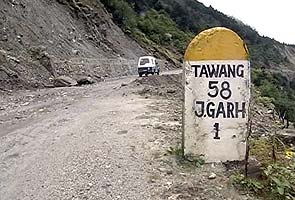
Bearing the brunt of resentment is the hardworking staff of the Border Roads Organisation (BRO), entrusted with widening and improving the roads. Enraged residents, unable to bear the hardship any more, have attacked BRO officials, destroyed their vehicles and have thrown heavy tippers and bulldozers down the steep valleys in the past six months.
Half a century earlier, this was where the marauding Chinese routed the Indian army, pushed into a war it was not prepared for in a tough terrain it was not used to.
Today the soldiers are definitely better looked after and unlike in 1962, they are well-trained to fight in the high-altitude terrain of Arunachal Pradesh.
But five decades down the line, infrastructure, especially the main arterial road connecting Tawang to the rest of India remains a major worry.
Jimmy Jibeso says, "Since the 1962 war, this route is very important for the north-east due to the Indo-china border. If the condition of the road is bad then how will Bofors reach the border in case of an attack. What will we do then? One needs good and big roads for Bofors. This is our main concern. Second concern is that medical help is not good up in Tawang and other places. If a patient has to be taken to Tezpur, Guwahati and other places, the road is so jerky and bad that the patient dies on the way. So we want good roads."
The Army, more than anyone else really requires this axis to be an all-weather road. Since 2010, it has inducted a full new division - over 20,000 additional soldier -for this sector.
The Border Roads Organisation, a quasi-military organization is entrusted with building and maintaining these strategic roads. Come rain or winter, labourers of Border Roads Organisation work to keep the only road link to Tawang open through the year but at the moment they are fighting a losing battle. The fault lies not with them but with people higher up who planned the widening of the only road without building an alternative.
Constant landslips, frequent blockades are a recurring challenge. But landslides apart , BRO officials tell us that they are plagued by a shortage of labour in this sector. Earlier, large groups from Jharkhand and Bihar made their way to these parts. No longer, since now plenty of work is available in their home states. Excruciatingly slow environmental clearances both by the central and state governments add to the delays.